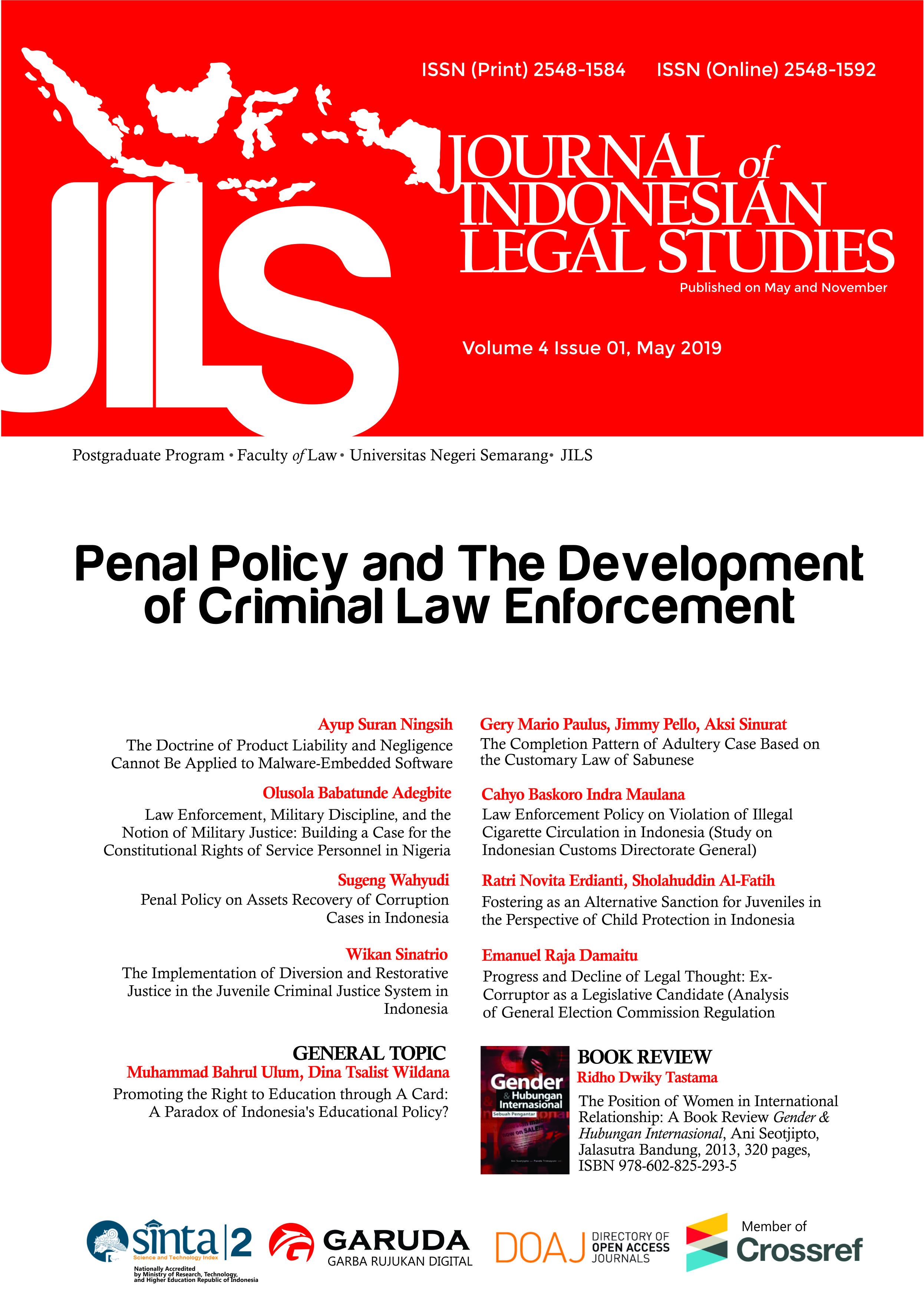Promoting the Right to Education through A Card: A Paradox of Indonesia's Educational Policy?
Main Article Content
Abstract
In 2015, the Indonesian government unveiled the Smart Indonesia Program, or Program Indonesia Pintar (PIP). The program consisted of educational subsidies through cash transfers exclusively granted to students aged from 6 to 21 years old from poor families. This paper examines the role of the PIP subsidy pertaining to the fulfilment of the right to education. As a consequence, it resulted in a competing account between cash transfers and the minimum standard of government duties to fulfil the need for adequate educational support. There is a paradox in the government's educational policy on the fulfilment of human rights to education in dealing with the PIP program. While educational complexities faced in remote areas cannot be hindered and it is granted not solely to students from vulnerable families. Such discrepancies in programs circumstantially affirm that the government ignores the root of Indonesia's educational problems, including providing free education as its obligation to human rights. The research conducted concludes by suggesting the government to evaluate the current policies by considering budget priorities and the efficiency of providing inclusive education.
Article Details

This work is licensed under a Creative Commons Attribution-ShareAlike 4.0 International License.
All writings published in this journal are personal views of the authors and do not represent the views of this journal and the author's affiliated institutions. Author(s) retain copyrights under the licence of Creative Commons Attribution-ShareAlike 4.0 International (CC BY-SA 4.0).
References
Ahmad, Ahmad. Kinerja Program Indonesia Pintar Melalui Kartu Indonesia Pintar (Survei Pada 6 Provinsi Di Indonesia). Jurnal Ekonomi Dan Manajemen (Journal of Economics and Management) 19, no. 1 (2018).
Akar Kontroversi Pendidikan Gratis Di Jember - Beritajatim News. Accessed February 19, 2017. http://beritajatim.com/pendidikan_kesehatan/272130/akar_kontroversi_pendidikan_gratis_di_jember.html.
Anggaran Pendidikan Gratis Di Jember Tak Sesuai Kalkulasi Awal - Beritajatim News. Accessed February 19, 2017. http://beritajatim.com/politik_pemerintahan/280688/anggaran_pendidikan_gratis_di_jember_tak_sesuai_kalkulasi_awal.html.
Bangay, Colin. Private Education: Relevant or Redundant? Private Education, Decentralisation and National Provision in Indonesia. Compare: A Journal of Comparative and International Education 35, no. 2 (June 2005): 167–79. https://doi.org/10.1080/03057920500129742.
Brauw, Alan de, and John Hoddinott. Must Conditional Cash Transfer Programs Be Conditioned to Be Effective? The Impact of Conditioning Transfers on School Enrollment in Mexico. Journal of Development Economics 96, no. 2 (November 2011): 359-370. https://doi.org/10.1016/j.jdeveco.2010.08.014.
Chang, Mae Chu, Sheldon Shaeffer, Samer Al-Samarrai, Andrew B. Ragatz, Joppe de Ree, and Ritchie Stevenson. Teacher Reform in Indonesia: The Role of Politics and Evidence in Policy Making. The World Bank, 2013. https://doi.org/10.1596/978-0-8213-9829-6.
DPRD: Pendidikan Gratis Jember Seharga 1 Pak Rokok - Beritajatim News. Accessed February 19, 2017. http://beritajatim.com/politik_pemerintahan/280655/dprd:_pendidikan_gratis_jember_seharga_1_pak_rokok.html.
Fasli Jalal, Muchlas Samani, Mae Chu Chang, Ritchie Stevenson, Andrew B Ragatz, and Siwage D Negara. Teacher Certification in Indonesia: A Strategy for Teaching Quality Improvement. Ministry of National Education, 2009.
Garcia, Marito, Charity G. Moore, and Charity M. T. Moore. The Cash Dividend: The Rise of Cash Transfer Programs in Sub-Saharan Africa. World Bank Publications, 2012.
Hanushek, Eric A. Economic Growth in Developing Countries: The Role of Human Capital.†Economics of Education Review 37 (2013): 204-212.
Kharisma, Bayu. Dampak Program Bantuan Operasional Sekolah (BOS) Terhadap Tingkat Putus Sekolah Di Indonesia: Analisis DID. Jurnal Ekonomi Kuantitatif Terapan 6, no. 1 (2013). http://ojs.unud.ac.id/index.php/jekt/article/view/4508.
Kristiansen, Stein, and Pratikno. Decentralising Education in Indonesia. International Journal of Educational Development 26, no. 5 (September 2006): 513-531. https://doi.org/10.1016/j.ijedudev.2005.12.003.
Law No. 23 of 2014 on Regional Authorities. Accessed January 5, 2018. http://www2.bkpm.go.id/images/uploads/prosedur_investasi/file_upload/UU_23_2014.pdf.
Liputan6.com. Mendikbud Muhadjir Alihkan Penyaluran Dana KIP Melalui Sekolah. liputan6.com. Accessed February 18, 2017. http://news.liputan6.com/read/2619081/mendikbud-muhadjir-alihkan-penyaluran-dana-kip-melalui-sekolah.
Manning, Chris, and Sudarno Sumarto. Employment, Living Standards and Poverty in Contemporary Indonesia. Institute of Southeast Asian Studies, 2011.
McDonald, Peter. “A Population Projection for Indonesia, 2010-2035. Bulletin of Indonesian Economic Studies 50, no. 1 (January 2, 2014): 123-129. https://doi.org/10.1080/00074918.2014.896240.
Ministerial Regulation of Education and Culture No. 12 of 2015 on Smart Indonesia Program. Accessed January 8, 2018. http://peraturan.go.id/inc/view/11e578a062c7c1e696b6313633363335.html.
Ministerial Regulation of Education and Culture No. 80 of 2013 on Universal Secondary Education. Accessed January 5, 2018. http://kelembagaan.ristekdikti.go.id/wp-content/uploads/2016/11/permen_tahun2013_nomor80.pdf.
OECD. OECD Economic Surveys: Indonesia 2016. OECD Publishing, 2016.
Organisation for Economic Co-operation and Development. PISA 2015: PISA Result in Focus, 2016. https://www.oecd.org/pisa/pisa-2015-results-in-focus.pdf.
OECD. Singapore: Rapid Improvement Followed by Strong Performance. Accessed February 19, 2017. https://www.oecd.org/countries/singapore/46581101.pdf.
Paxson, Christina, and Norbert Schady. Does Money Matter? The Effects of Cash Transfers on Child Development in Rural Ecuador. Economic Development and Cultural Change 59, no. 1 (October 2010): 187-229. https://doi.org/10.1086/655458.
Perdana, Novrian Satria. Faktor-Faktor Yang Berpengaruh Terhadap Aksesibilitas Memperoleh Pendidikan Untuk Anak-Anak Di Indonesia. Jurnal Pendidikan Dan Kebudayaan 21, no. 3 (2015): 279-298.
Post, The Jakarta. Indonesia’s PISA Results Show Need to Use Education Resources More Efficiently. The Jakarta Post. Accessed February 27, 2017. http://www.thejakartapost.com/academia/2016/12/18/indonesias-pisa-results-show-need-to-use-education-resources-more-efficiently.html.
Program Indonesia Pintar Melalui Kartu Indonesia Pintar (KIP) - Klaster I - Tanya Jawab : Tim Nasional Percepatan Penanggulangan Kemiskinan - TNP2K. Accessed February 19, 2017. http://www.tnp2k.go.id/id/tanya-jawab/klaster-i/program-indonesia-pintar-melalui-kartu-indonesia-pintar-kip/.
Ramli, Ramli, and Nizwardi Jalinus. “Evaluasi Kinerja Guru Sekolah Menengah Kejuruan Sumatera Barat Pascasertifikasi.†Jurnal Penelitian Dan Evaluasi Pendidikan 17, no. 1 (2013): 72-87.
Saraswati, Lilis Novia. Implementasi Kebijakan Program Indonesia Pintar (PIP) Pada Jenjang Sekolah Dasar Di Kecamatan Sungai Pinang Kota Samarinda, n.d.
Sartika, Dian Prima Safitri, and Edison. Implementasi Program Kartu Indonesia Pintar Di Kota Tanjungpinang. Universitas Maritim Raja Ali Haji, 2017.
Solichah, Pewarta: Zumrotun. DPRD: Penerima “PIP” Jember Tidak Tepat Sasaran. Accessed February 18, 2017. http://www.antarajatim.com/lihat/berita/171374/dprd-penerima-pip-jember-tidak-tepat-sasaran.
Sugiono, Risca Kurniasari Agus, Taufik Kurrohman, and others. Pengaruh Ketepatan Dana, Kecukupan Dana Dan Sasaran Penggunaan Dana Bantuan Operasional Sekolah Terhadap Peningkatan Prestasi Belajar Siswa Di Kabupaten Jember.E-Journal Ekonomi Bisnis Dan Akuntansi 2, no. 1 (2015): 23-28.
Tan, Oon-Seng, Woon-Chia Liu, and Ee-Ling Low. Teacher Education in the 21st Century: Singapore’s Evolution and Innovation. Springer, 2017.
Tussman, Jospeh, and Jacobus TenBroek. “The Equal Protection of the Laws. Cal. L. Rev. 37 (1948): 341.
UNICEF, and UNESCO, eds. A Human Rights-Based Approach to Education for All. New York: UNICEF, 2007.
